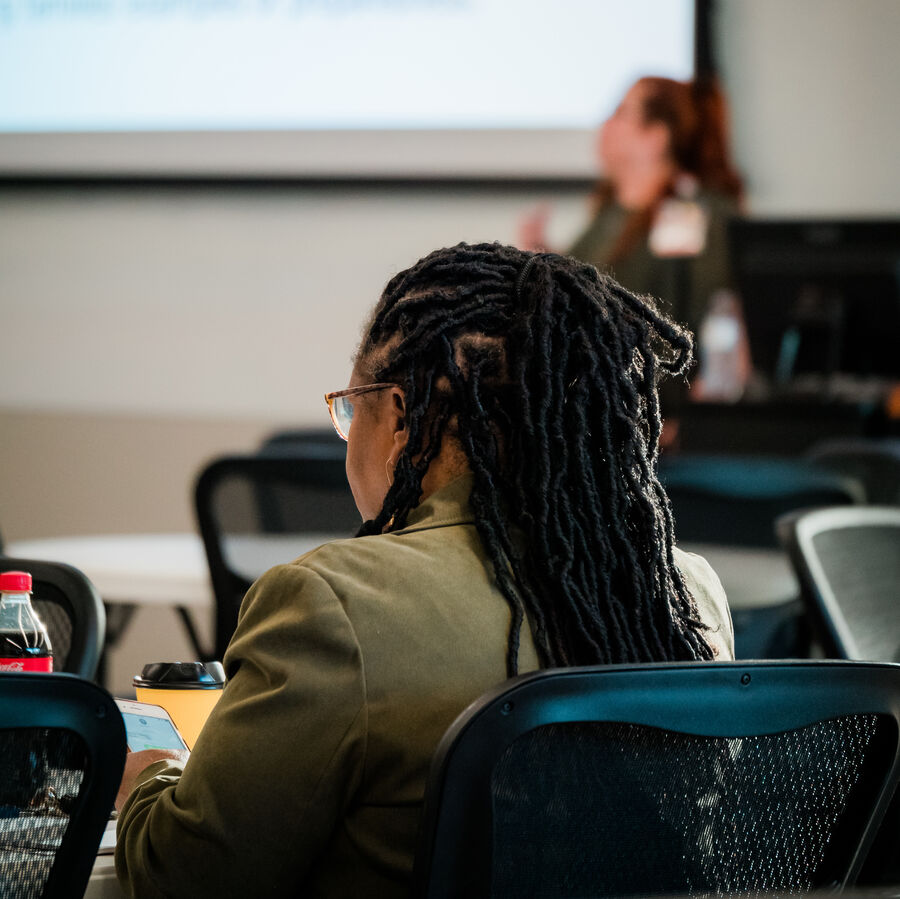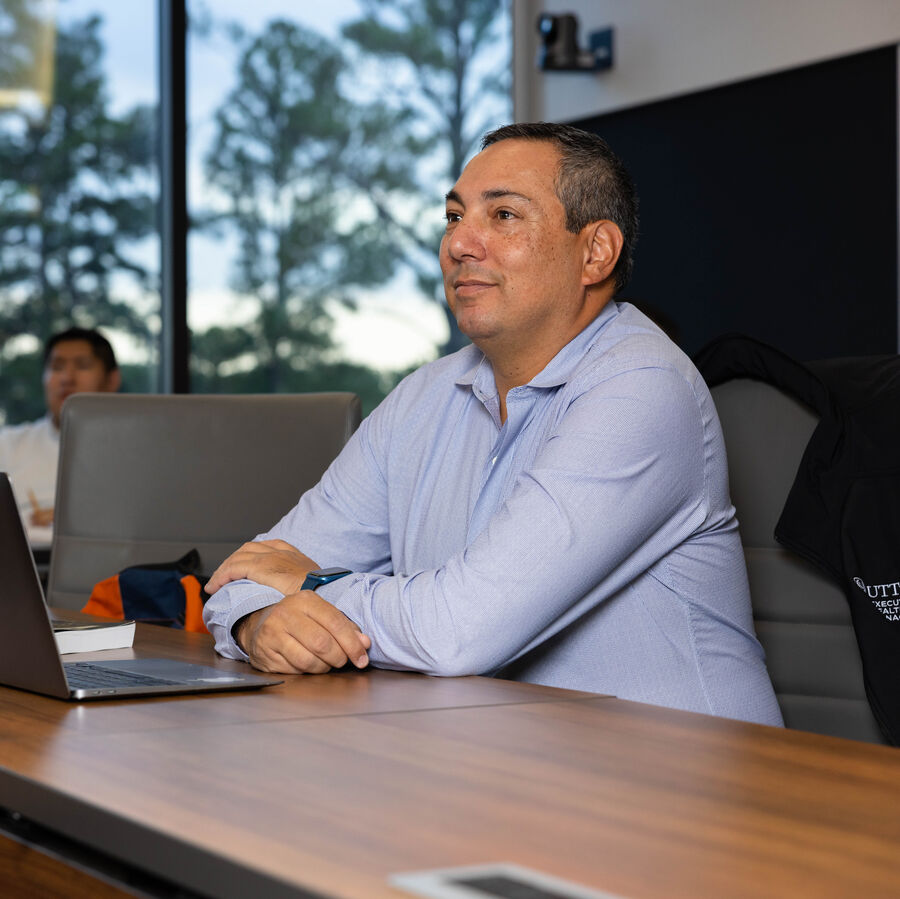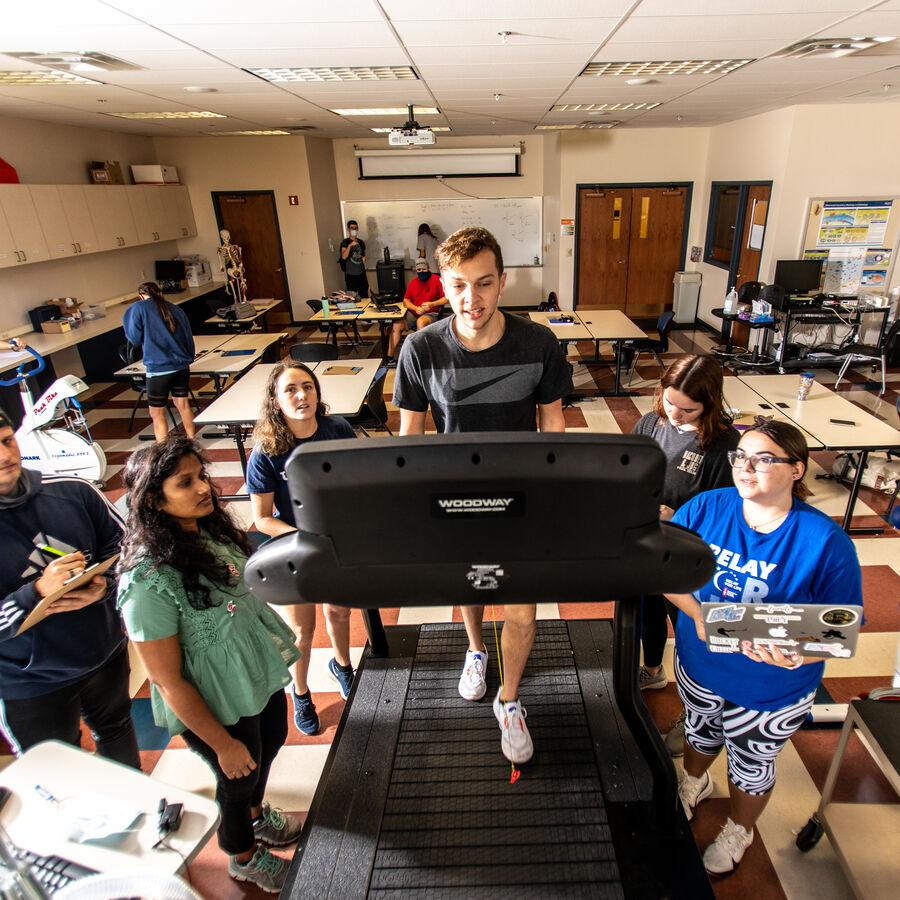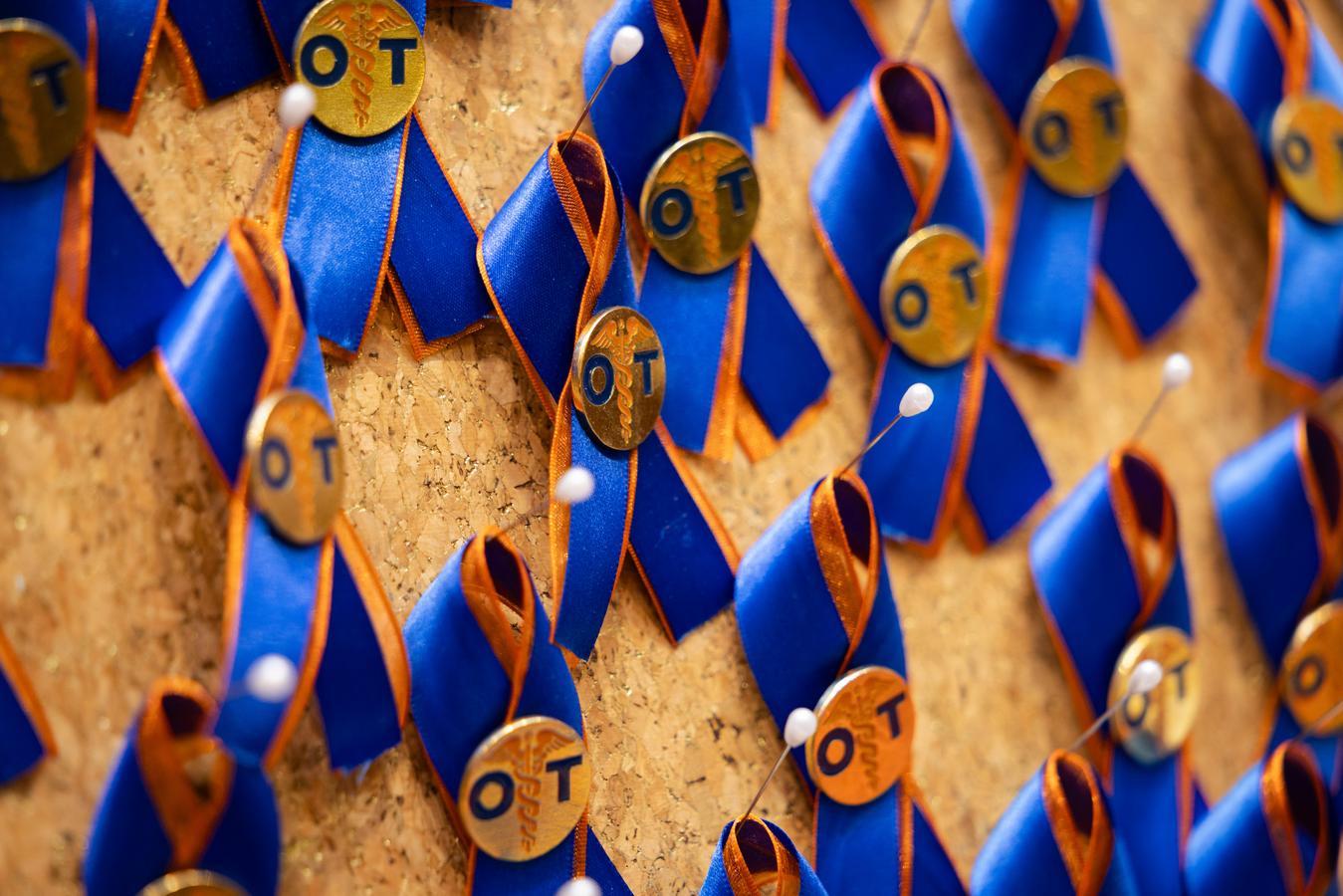
Master of Occupational Therapy

The Master of Occupational Therapy (MOT) pathway is an entry-level pathway designed for students who would like to become registered Occupational Therapists (OTRs).
The program has taken action to shorten the program length to 24 months with a goal to launch the changes Fall 2025.
There are two pathways for students entering into the MOT program. Program requires 56 - 63 credits based on the path selected.
1. COTA-to-MOT Bridge Pathway: requires students to be a Certified Occupational Therapy Assistant (COTA) with a bachelor's degree.
2. Entry-Level Occupational Therapy Pathway for Non-COTA Applicants: this pathway requires students to have a bachelor's degree; however, no previous certification is needed. Three additional content areas will be added to the entry-level curriculum: Professional Communication, Skills and Documentation, Basic Disease Processes.
Students will attend five semesters of blended instruction, combining online with on-campus delivery, followed by two, twelve-week Fieldwork experiences. These courses and fieldwork experiences allow the student to graduate with the MOT degree, and to sit for the National Board of Certification for Occupational Therapy registration exam. Students who obtain a passing score on the exam will become registered occupational therapists (OTRs), eligible for state licensure. Our program continues to be a strong and top rated program for NBCOT pass rate and employment rate. More information about our program’s pass rate.
NBCOT pass rate data 3 year information: 98.6% three year average
2021: 100%
2022: 100%
2023: 96%
2024: 100%
NBCOT Exam: The student is to follow the NBCOT checklist instructions in the student portal for instructions on how to sign up for the NBCOT OTR exam upon completion of the academic portion of the program after Fieldwork Level II. Felony conviction may impact a graduate's eligibility for certification and credentialing. For more information, visit www.nbcot.org.
Students will be admitted to the MOT program once a year in the Fall semester.
Admission Outcomes
MOT Program Admission and Graduation Data
|
Admitted Year /Graduation Year |
Students Entering/Graduating |
Graduation Rate |
|---|---|---|
|
2019 Cohort 1 Adm 20 |
Admitted 20/ 19 Graduates |
19/20 Graduation 2020 |
|
2020 Cohort 2 Adm 22 |
Admitted 22/21 Graduates |
21/22 Graduation 2021 |
|
2021 Cohort 3 Adm 24 |
Admitted 24/24 Graduates |
24/24 Graduation 2022 |
|
2022 Cohort 4 Adm 24 |
Admitted 24/ Graduation Fall 2023 |
24/24 Graduated 2023 |
|
2023 Cohort 5 Adm 24 |
Admitted 24/ Graduation Fall 2024 |
23/24 Graduated 2024 |
|
2024 Cohort 6 Adm 33 (added 9 entry-level, 24 bridge) |
Admitted 33/ Graduation Fall 2025 |
26 Graduated 2025 |
|
2025 Cohort 7 (two pathways) Adm 44 (added 20 entry-level, 24 bridge) |
Admitted 44/ Graduation Fall 2026 |
|
- 3 year graduation rate is 99%
- 3 year total is 73 degrees conferred
Mission
The University of Texas at Tyler's Master of Occupational Therapy program is committed to providing access to a high-quality occupational therapy program for individuals seeking to enhance their professional development, broaden their perspectives and enrich their lives. We are committed to providing students education rooted in occupation and driven by client needs and evidence-based practice. Faculty and students engage in creative scholarly inquiry, innovative knowledge translation and community-based servers that promotes health and wellness through occupational therapy practice. The AOTA Mission and Vision and the Program MIssion align to promote the mission of AOTA which serves as a guiding light for the occupational therapy profession. Our mission statement guides us as we advance the work of occupational therapy practitioners, and our vision will lead the profession into the future.
The MOT program has identified the following goals:
- Maintain and pursue excellence in teaching
- Role model occupation therapy practice and professionalism.
- Create and value opportunities to support lifelong learning.
- Participate in university and community service.
- Build partnerships with healthcare providers.
- Promote scholarly work production and dissemination.
- Establish student organizations within OT program.
Program Philosophy
Recognizing that occupation is essential throughout the human life span, it is incorporated within the beginning, middle, and end of each UTT-MOT student's educational experience. We believe in the art and science of occupational therapy practice, and seek to facilitate development of necessary knowledge, skills, and attitudes in our graduates to enable culturally-sensitive, ethical, holistic, client-centered, evidence-based practice. The program believes in student learning objectives being met in an efficient, quality and evidence based driven content delivery platform in a hybrid manner to facilitate the modern student learning to prepare entry-level generalist clinicians.
Program Overview
- Bridge Pathway: The UTT-MOT is an entry-level program; however, all students admitted to the program will be licensed, experienced Certified Occupational Therapy Assistants (COTAs). Experienced COTA MOT students possess foundational experiences in occupational therapy practice and prior knowledge that shape both the student and the educator. Students will be engaged in advanced clinical reasoning and critical thinking processes that build upon their prior knowledge and skill sets and will be challenged to develop enhanced capacity for reflective practice.
- Entry Level Pathway: This pathway will be open to non-COTAs who meet the program pre-requisites.
- The UTT MOT program integrates current theories of adult learning and engagement throughout the MOT's student academic experiences to foster academic achievement in students.
- The UTT MOT program supports self-directed learning through active engagement in academic and scholarly activities in classrooms, community and online learning environments. Students will be challenged to construct new understanding of foundational knowledge obtained as part of their OTA educational experiences. The triad of classroom, lab and community experiences allows for an authentic focus on real-world learning and client interface that promotes transfer of didactic knowledge to current and emerging practice settings as students respond to each individual client's complex need for participation in meaningful occupations to promote occupational therapy outcomes.
The entry-level occupational therapy master’s degree program is accredited by the Accreditation Council for Occupational Therapy Education (ACOTE) of the American Occupational Therapy Association (AOTA), located at 7501 Wisconsin Avenue, Suite 510 E Bethesda, MD 20814. ACOTE’s telephone number is (301) 652-AOTA (2682) and (301) 652-6611, email is accred@aota.org and its web address is www.acoteonline.org. Graduates of the program will be eligible to sit for the national certification examination for the occupational therapist administered by the National Board for Certification in Occupational Therapy (NBCOT). After successful completion of this exam, the individual will be an Occupational Therapist, Registered (OTR). In addition, all states require licensure in order to practice; however, state licenses are usually based on the results of the NBCOT Certification Examination. Note that a felony conviction may affect a graduate’s ability to sit for the NBCOT certification examination or attain state licensure.
Visit the Department of Rehabilitation Sciences
What Can You Do With a Master of Occupational Therapy?
Reach a new level in this rapidly growing field as a licensed occupational therapist. The Bureau of Labor Statistics projects 14% more positions by 2031, a rate much faster than average. Additionally, there is a growing demand nationally and within East Texas for healthcare workers trained in mental health needs, including within rehabilitation.
Or, use your rehabilitation expertise and experience to serve in related areas, finding work as a:
- Consultant
- Director of Rehabilitation
- Health Education Specialist
- Occupational Therapy Supervisor
- Rehabilitation Liaison
- Entrepreneur or Professor
Graduation Requirements
- All academic courses must be completed within no more than 36 months from the date the student takes the first course in the MOT curriculum, and all fieldwork experiences must be completed with 24 months of academic coursework completion.
- Leave of absence requests can be sent to the Program Director with the leave and program requirements to be completed within the required timeframe.
- Details for successful Fieldwork completion will be provided in your Student Fieldwork Manual by your Academic Fieldwork Coordinator.
- Rationale for Program Length: All academic courses must be completed within no more than 36 months from the date the student takes the first course in the MOT curriculum, and all fieldwork experiences must be completed within 24 months of academic coursework completion. Details for successful Fieldwork completion will be provided in your Student Fieldwork Manual by your Academic Fieldwork Coordinator. Rationale for this is guidance from ACOTE for preferred required length for Masters programs. The program length aims to stay competitive and consistent with trends in higher education and healthcare needs for entry-level Occupational Therapy practitioners. The program curriculum is designed to prepare entry level generalist clinicians within this timeframe by meeting all ACOTE A-C standards in a timely manner with quality education provided for entry-level preparedness.
Admission Requirements
(Please read carefully as some requirements have changed.)
|
|
Entry Level |
COTA |
|---|---|---|
| Complete online application | ✓ | ✓ |
| Baccalaureate degree | ✓ | ✓ |
| One year experience as a COTA (or 1500 hours) | ✓ | |
| 50 Observation hours of an OT in two different settings | ✓ | |
| Writing Sample on the topic "Why do you want to be an Occupational Therapist" | ✓ | ✓ |
| Overall GPA of 3.0/4.0 on the last calculate 60 credit hours | ✓ | ✓ |
| Resume | ✓ | ✓ |
| Prerequisite courses with a grade of B or higher | ✓ | ✓ |
| Interview | ✓ | ✓ |
Important Dates
- Applications for Fall will open August 1.
- Application deadline:
Bridge program deadline: March 1
Entry-level program deadline: April 1 - Decision deadline: May 1
Who can apply
- Certified Occupational Therapy Assistants (COTA) for Bridge Pathway AND effective 2024 entry-level Non-COTA applicants who meet the pre-requisite requirements
Course Information
The estimated total cost of attendance for the program is $30,000 (inclusive of tuition fees and internal program fees).
MOT Program Cost and Fees
Program credits have been reduced due to shortening of program length. Please contact financial aid for updated tuition.
Entry Level Pathway
|
Fee Description |
Fall 1
14 credits |
Spring 1
15 credits |
Summer 1
9 credits |
Fall 2
9 credits |
Spring 2
8 credits |
Summer 2
8 credits |
Estimated Total Program Cost 63 credits |
|---|---|---|---|---|---|---|---|
|
Tuition and Fees |
$6,293 |
$6,696 |
$4,245 |
$4,245 |
$3,829 |
$3,829 |
$29,137 |
|
Online Education |
$350 |
$375 |
$225 |
$225 |
$200 |
$200 |
$1,575 |
|
Differential Tuition |
$420 |
$450 |
$270 |
$270 |
$240 |
$240 |
$1,890 |
|
Total |
$7,063 |
$7,521 |
$4,740 |
$4,740 |
$4,269 |
$4,269 |
$32,602.00 |
MOT Program Costs Approximately $2,000 inclusive of general items (example books, memberships, immunizations, and background check/drug screen etc.) = $34,602.00
Bridge (COTA-OCR) Pathway
|
Fee Description |
Fall 1
13 credits |
Spring 1
9 credits |
Summer 1
9 credits |
Fall 2
9 credits |
Spring 2
8 credits |
Summer 2
8 credits |
Estimated Total Program Cost 56 credits |
|---|---|---|---|---|---|---|---|
|
Tuition and Fees |
$5,890 |
$4,245 |
$4,245 |
$4,245 |
$3,829 |
$3,829 |
$26,283 |
|
Online Education |
$325 |
$225 |
$225 |
$225 |
$200 |
$200 |
$1,400 |
|
Differential Tuition |
$390 |
$270 |
$270 |
$270 |
$240 |
$240 |
$1,680 |
|
Total Cost |
$6,605 |
$4,740 |
$4,740 |
$4,740 |
$4,269 |
$4,269 |
$29,363.00 |
MOT Program Costs Approximately $2,000 inclusive of general items (example books, memberships, immunizations, and background check/drug screen etc.) = $31,363.00
- Required Courses
- Prerequisite Courses (17 hours) must earn a grade of “B” or better in each course
|
Course Prefix |
Course Number |
Title |
SCH |
|---|---|---|---|
|
PSYC |
Abnormal Psychology |
3 |
|
|
PSYC |
Lifespan Developmental Psychology TCCN: PSYC 2314 |
3 |
|
|
BIOL |
Anatomy & Physiology I Laboratory TCCN: BIOL 2101 |
1 |
|
|
BIOL |
Anatomy & Physiology I TCCN: BIOL 2301 |
3 |
|
|
BIOL |
Anatomy & Physiology II Laboratory TCCN: BIOL 2102 |
1 |
|
|
BIOL |
Anatomy & Physiology II TCCN: BIOL 2302 |
3 |
|
|
MATH |
Statistics TCCN: MATH 1342 |
3 |
Application Deadline:
Bridge program: March 1
Entry-Level program: April 1
Application Instructions:
- Submit the graduate school application.
- Submit official transcripts to Graduate Admissions Office*
- Submit resume to gradadmissions@uttyler.edu
- Fill out Prerequisite Form
- Have referrers submit reference forms to gradadmissions@uttyler.edu
- After April 1, application materials will be reviewed, and interviews scheduled on an individual basis.
- Final admissions decisions will be made by May 1.
*Official transcripts should be sent to:
Office of Graduate Admissions
3900 University Blvd, HPR 248
Tyler, TX 75799
Electronic transcripts must be sent directly from the issuing institution to gradadmissions@uttyler.edu.
For more information, contact MOT faculty and staff at ot@uttyler.edu.
More information about tuition, charges and fees.
Important Links
Frequently Asked Questions
Travel
As mentioned in your interviews, bridge students please prepare for travel expenses for classes held on Fridays and Saturdays in addition to preparing for not working during Fieldwork II. Students should be prepared to pay for gas and lodging expenses as well as food and snacks. If you call a local Tyler hotel, please ask for a student university rate. Unfortunately, the campus does not provide housing options for students who primarily live off campus.
Schedule
Bridge COTA-MOT Pathway: Students are expected to be on campus all day Friday and Saturdays. It is in the students’ best interest to make arrangements to be available Friday mornings for program responsibilities for fieldwork, guest lecture, or class meeting time if that needs to be scheduled early in the morning. Students typically finish courses by late afternoon on Saturdays. We understand this is a commitment; however, students typically are pleased that they are able to work during the weekdays without taking significant time off during fall and spring semesters for didactics. Entry Level Pathway: Traditional 9-5pm hours during the week for class attendance. Both pathways, per ACOTE, must complete unpaid fieldwork, students are encouraged to plan ahead to be able to complete two terms of full time clinical fieldwork.
Fieldwork
Students frequently asked if fieldwork opportunities are available in their area of residence. Our Academic Fieldwork Coordinator works closely with the students to identify opportunities that are most convenient while in the best educational interest of our students for accreditation.
Location of Program
Effective Fall 2023, the OT program will be housed at the UT Tyler Health Science Center Building H 3rd floor at 11937 US-271, Tyler, TX 75708.
Student Needs
There are some local food options outside of the hospital with some cafeteria options on weekdays. Due to our schedule and distance from restaurants, it’s best to bring a lunch and snacks to campus. We have student lounge options and a kitchen area. For nursing mothers there’s a mothers room available.
Program Costs
Once your application is approved and you are accepted, please prepare for general program costs including but bit limited to things like membership, uniform polos, textbooks, background check and drug screen costs, immunizations, etc.
Feel free to contact advising to get information on tuition, financial aid, and any qualifying scholarships or border waivers for out of state students.
Contact Us
For general program questions and how to get started, please contact us:
Graduate Admission Information
The University of Texas at Tyler
Office of Graduate Admissions
Office: HPR 248
Phone: 903.566.7457
Fax: 903.566.7492
gradadmissions@uttyler.edu
Degree Information
Dr. Anjali Parti
Chair of Department of
Rehabilitation Sciences
11937 U.S. Highway 271
Tyler, Texas 75708
Building A, Floor 6
Email: ot@uttyler.edu
Phone: 903.565.5714
Student Spotlight
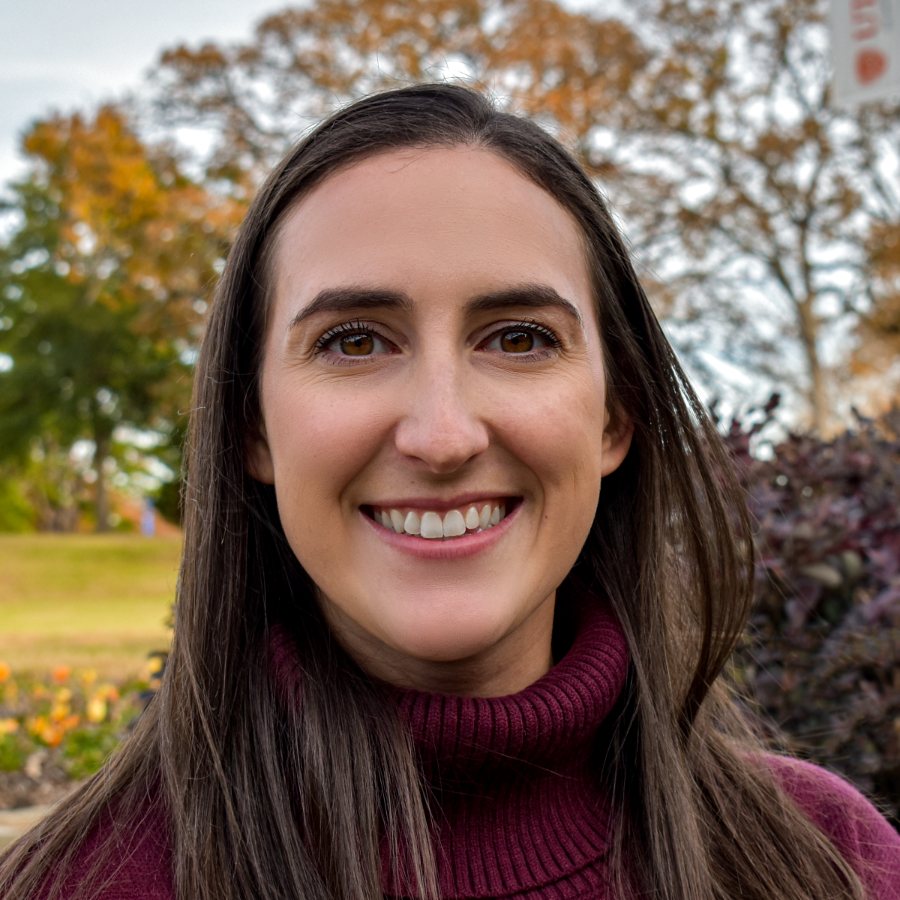
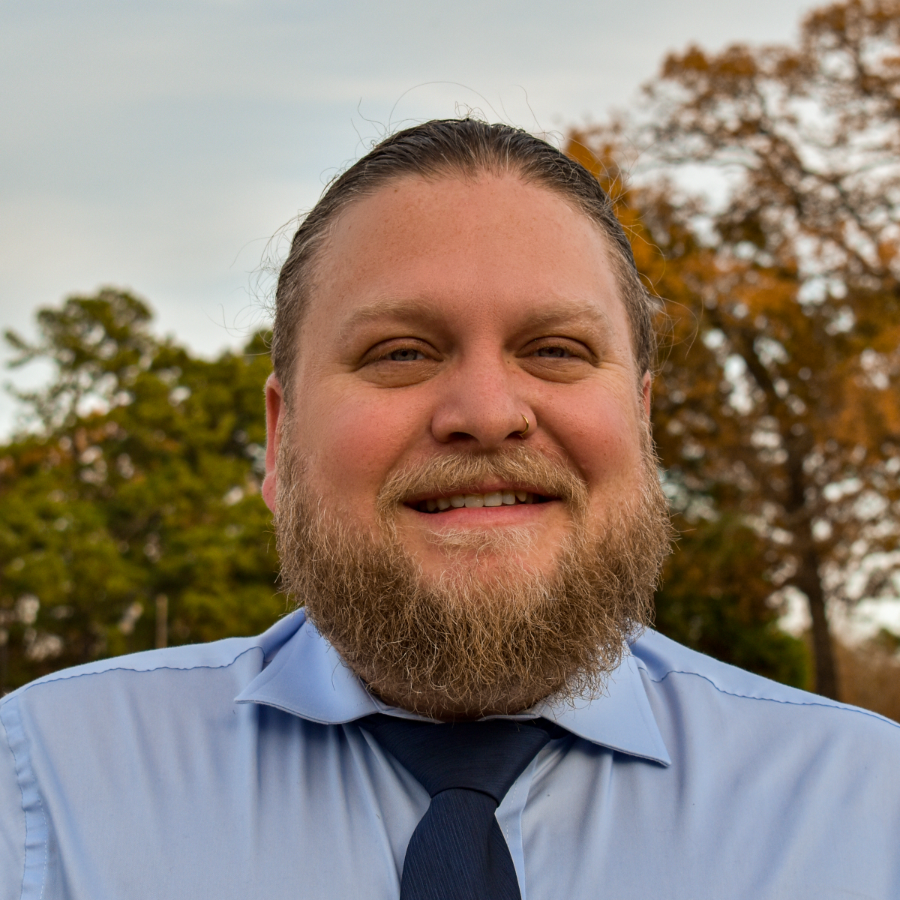
Justin Hughes
MOT, 2024
Explore Related Programs
Next Steps
Your future starts here. Advance your career as an occupational therapist at UT Tyler.
